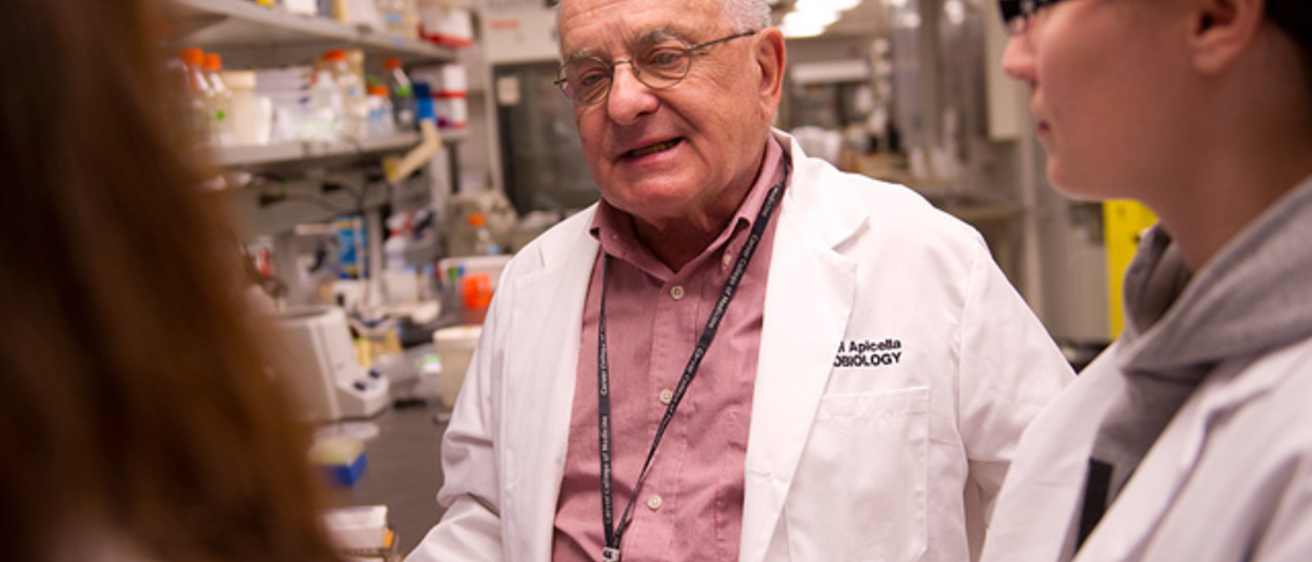Mike Apicella can name several people who helped him become what he is today, an international leader in understanding microbial pathogenesis whose research has advanced the development of vaccines and chemotherapies for meningitis, sexually transmitted diseases, and acute and chronic respiratory infections.
His high school English and religion teacher was Daniel Berrigan, a Jesuit priest and poet who gained fame as a peace activist during the Vietnam War. In medical school at the State University of New York, Apicella was a student in the pharmacology teaching laboratory of Robert Furchgott, who would win the 1988 Nobel Prize in Physiology or Medicine for research on nitric oxide’s role in the cardiovascular system. During residency at Ohio State University, then-chair of medicine James Warren, a renowned cardiologist, secured a small grant for Apicella to research antibiotic toxicity. As a third-year resident, Apicella saw patients by day and spent nights in the lab, eventually publishing a paper in The Journal of Laboratory and Clinical Medicine.
“That really hooked me,” he says. “I’ve had great mentors, and that’s the key. I’ve been blessed with mentors who looked at me as a person, with skills that could be developed, more than as someone who could be used to advance their own careers.”
Distinguished Mentor Award ceremony
Apicella will be honored as the 2012 recipient of the UI Carver College of Medicine’s Distinguished Mentor Award at a celebration beginning at 3 p.m., Thursday, Oct. 4, in Prem Sahai Auditorium, 1110 Medical Education and Research Facility, on the UI health sciences campus.
The event also features the Distinguished Mentor Lecture by historian David Oshinsky, who holds the Jack S. Blanton Chair in History at the University of Texas and is a Distinguished Scholar in Residence at New York University. His many books include A Conspiracy So Immense: The World of Joe McCarthy, as well as Worse Than Slavery, and the Pulitzer Prize-winning Polio: An American Story.
The Distinguished Mentor Award and Lecture were established and are supported by a gift to the UI Foundation from UI graduates Nancy Granner and Daryl Granner of North Liberty, Iowa.
Apicella is the 2012 recipient of the Distinguished Mentor Award in the University of Iowa Roy J. and Lucille A. Carver College of Medicine, where he is senior associate dean for scientific affairs and professor of microbiology.
His nominators—former trainees and colleagues who are leaders in academic medicine—credit Apicella with a special talent for helping people develop their academic careers. Repeatedly they claim they would not have achieved their success without Apicella, who influenced their own approach to mentoring as well.
“He always tried to be inclusive of his trainees in projects and publications. However, he also knew that he had to foster independence among his trainees. Perhaps his greatest gift was to know when to get out of the way when someone was ready to go off on his or her own,” says Stanley Spinola, professor of medicine, microbiology, immunology, pathology, and laboratory medicine and head of microbiology and immunology at Indiana University School of Medicine.
Apicella came to the UI in 1993 and chaired the microbiology department for 18 years. During his tenure as department head, extramural funding increased almost tenfold from $1.5 million in 1993 to $14 million in 2010, and since 2006, the department has consistently ranked in the top 15 microbiology departments in the nation in National Institutes of Health funding. He has directly participated in the training of three master’s and 17 doctoral-level graduates and nearly 30 postdoctoral fellows.
“I gain a lot from them succeeding. I feel good about it,” he says. “That to me is the greatest reward, to work with people and be able to feel good about it.”
“Mike is excellent at sizing people up, figuring out their strengths and weaknesses, and encouraging their strengths. This is one lesson that I learned from him that has worked well for me with members of my laboratory and with colleagues,” says Caroline Harwood, the Gerald and Lyn Grinstein Professor in Microbiology at the University of Washington School of Medicine.
The mentoring doesn’t stop when trainees complete their work in his lab. Apicella shares feedback on their grant applications, helps them build personal contacts in the scientific community, and advises them on numerous professional decisions. He becomes a mentor for life, “someone who cares about his students beyond the range when he would be expected by most to support them,” says W. Edward Swords, associate professor of microbiology and immunology at Wake Forest University School of Medicine.
Commitment is something Apicella learned from his father, a lawyer in Brooklyn, N.Y. When Apicella was young, his father took him along on Saturday-morning visits to the shopkeepers in an Italian neighborhood. They walked from business to business, checking in on each merchant. Apicella’s father read their mail to them or helped write out their checks to pay their bills since many of the immigrants didn’t read or speak English.
“He was really involved with these people and committed to them. I learned at a young age to have a commitment to people, to not give up on them,” Apicella says.
